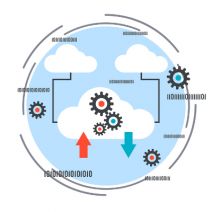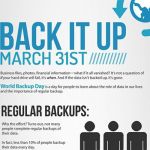Cyberthreats aren’t just occasional inconveniences, especially nowadays. They are constant, evolving, and some are so highly sophisticated that you can hardly blame yourself if you fall victim to them. This is why proactivity is so important. Businesses that take a reactive approach to cybersecurity find themselves in a never-ending cycle of damage control. Without a purposeful cybersecurity strategy, any organization faces recurring breaches, data loss, and ultimately a situation where customer distrust can result in the company's financial ruin. This month, we thought we would take a look at why having a comprehensive cybersecurity strategy that addresses these risks is so critical for the modern business to accomplish.
Directive Blogs
When your business’ data is so crucial to your successful operations, there are certain precautions that you simply need to take for the sake of your business’ longevity. One such precaution: data backup.
Your data is the gas that powers your business’ engine, whether you’re referring to project files and intellectual property or financial info and customer records. As such, imagine what it would mean if your business ran out of gas… or, more accurately, it was siphoned out.
There are plenty of reasons why a business might lose some or all of its data, ranging from cyberattacks to hardware failure. Unfortunately, there isn’t any real reason your business won’t be one of the unlucky ones.
This makes it imperative that you prepare for this eventuality. Let’s discuss how to do so with the help of data redundancy.
Today—March 31st—is World Backup Day, an annual reminder to think about how well you’re protecting your data. Is your business prepared to prevent—or recover from—a data loss disaster? And while you’re at it, have you taken steps to back up your personal information as well?
Running a business is basically a never-ending series of potential disasters just waiting to happen. Some are easy to fix, change a process here, tweak a strategy there—but others? They can completely derail your operations if you’re not prepared. That’s where smart technology steps in to save the day.
Let’s look at some nightmare scenarios that could spell disaster unless you have the right IT in place.
Running a business is already confusing enough without worrying about security at all times. Whether you’re a small business owner or a multi-level enterprise, security is just as important for all the same reasons. Today, we want to share a couple of security strategies you can implement today to feel better about the current state of your infrastructure moving forward.
Every business’ worst nightmare is a data loss incident, and if you’re caught unawares, such an incident can set you back financially and operationally for months. Today, we want to cover some of the common data your business collects that you absolutely need to have backed up. If you don’t, you could become subject to serious fines due to regulations and other industry-specific mandates.
 Data Backup and Disaster Recovery (BDR) isn’t your average data backup solution. In fact, it’s far from any traditional backup tool that you might have used in recent years. Here’s how BDR is changing the way that organizations approach business continuity and ensuring their continued success and sustainability.
Data Backup and Disaster Recovery (BDR) isn’t your average data backup solution. In fact, it’s far from any traditional backup tool that you might have used in recent years. Here’s how BDR is changing the way that organizations approach business continuity and ensuring their continued success and sustainability.
To keep your business running smoothly, even if something goes wrong—like a power outage, cyberattack, or other disaster—you need a reliable way to protect your data. That’s where data backup comes in. It’s important to make sure your backup is thorough and trustworthy so you can recover if things go south.
Other than the innovative jump from tape, data backup hasn’t seen too many great leaps forward, so to speak. Sure, businesses don’t have to worry about resource-intensive manual backups anymore, but the standard approach is so rock-solid that innovation isn’t necessarily needed at this point. Today, we are exploring the backup and disaster recovery process and how modern-day solutions have made an effective tool even better.
Nostalgia is a powerful force. It can drive us to look to the past for things we once loved, such as the music we listened to over the years. However, what if the music you loved was lost forever?
This could be the case for many, as older hard drives that archive this music have been discovered to have failed. Let’s examine the situation to see what lessons any small-to-medium-sized business can learn.
Digital storage has exploded, in no uncertain terms, over the last few decades. While hard disk drives (HDDs) were the predominant storage format for most of that time, today’s faster and hardier solid-state drives (or SSDs) are becoming more affordable and popular.
However, there are still plenty of HDDs out there, all far more prone to breaking than their more advanced counterparts. So, how can you tell when a hard drive failure is pending?
We have frequently espoused the benefits of data backups, referring to how critical they are should your business experience a disaster at any scale. However, there is always the concern that your backups could also be altered negatively. This is one reason that immutable backups exist.
Let’s take a few moments to examine the concept of an immutable backup and its benefits.
Business can get messy, particularly when variables outside your control are involved, which could spell doom for your organization. We’re talking, of course, about instances where your organization might be under a particularly large threat—instances where your data is at risk, which could jeopardize your future. Thankfully, there are options to mitigate this risk.
Nowadays, businesses need to be prepared for almost every circumstance. You may have heard the term “BDR” used to describe a method of attaining this level of preparation. We wanted to discuss this term in more depth, covering what it refers to and what you need to do to protect your business should BDR be right for you.
Spoiler alert: it very much is.
How often do you think about your data backup system? If you’re like most businesses, it’s something that you will likely set up, then quickly forget about, provided you haven’t had to use it. Still, having one is essential to any modern business, and building it with clear outcomes and metrics in mind will help you make your data backup system more effective for the moments when you’re glad you have it.
You don’t need us to tell you that ransomware is a problem (or maybe you do–we mean, it’s a huge problem). It’s dangerous to both businesses and individuals, and it has become such a common threat that all organizations need to have a plan in place to address it with their staff. Today, we want to highlight a three-part strategy that you can use to approach ransomware in the most secure way possible.
We often discuss data backup and disaster recovery on our blog, and you may even be familiar with some of the terms and practices we throw around. Today, we want to take a closer look at the 3-2-1 rule and how it impacts your business’ ability to recover in the face of a disaster. Let’s dive in and see how the 3-2-1 rule can make or break your company’s data infrastructure.
When you suffer a data breach, you might wonder how you can possibly come back from such an event, especially if it leads to a network compromise. Can your business rebound effectively, and if so, what do you need to do to make sure that it doesn’t happen again? It all starts with understanding how much data you need to function, as well as how much downtime you can afford to suffer from.
It doesn’t matter where your business is located; whether it’s a tornado that rolls through your city, a structural fire that renders your office uninhabitable, or a freak snowstorm that brings down power lines or grinds travel to a halt, you’ll want to be ready for it all. We’ll go over what kinds of solutions your business can implement to ensure that no disaster, be it natural or artificial, like a cyberattack, puts a stop to your operations.
Tomorrow, March 31st, is the official World Backup Day, a day intended to remind us all of the importance of taking backups for the sake of data continuity. While this kind of day can be a valuable reminder of a critical best practice, we contend that your awareness of your backup (and the associated maintenance of it) should not be limited to a single day.
World Backup Day is March 31st, each and every year. However, while there is value to having a dedicated holiday to raise awareness of the need for backup, it should not be the only time it is considered. Let’s go over the importance of proper backup practices, just in time for the holiday, so that you can establish the backup that your business needs if it's not already in place.
Because of the protection it can offer your organization, data backup is a necessary tool for you to have—that is, provided it has the requisite security and reliability you’ll need should you ever have to lean on it. Let’s go over a few guidelines to help you be sure that your backup is trustworthy enough to stake your business’ future on.
I hope I don’t have to tell you how important your business’ data is to its continued survival, just as I hope I don’t need to explain why this makes this data a priority to protect, regardless of your business’ size. What I do want to explain is the concept of the 3-2-1 Rule and how it pertains to your data backup, and why we would recommend that one for your business’ purposes.
March 31 is World Backup Day. Data is a commodity, but unlike other commodities--it can be replicated without hurting its value. As a result, data backup has become a critical need for the modern business. World Backup Day has been created to remind people to protect their assets by backing up their files.
Having a comprehensive data backup and recovery strategy in place can absolutely save your business. This means it’s extremely important. Unfortunately, too many businesses don’t consider their backup and recovery systems until it is too late. Let’s unwrap what makes a successful backup and recovery platform work, and how to get one for your business.
Unfortunately, the more people lean on technology, the more data breaches there are. The correlation makes sense, but with so much innovation in data security and data systems, it’s a shame more can’t be done to keep businesses and individuals from losing data to opportunists and scammers. That’s why knowing how to circumvent these forces is essential to keep your data safe. Let’s take a look at how the people that are best at it keep their data secure.
If you look hard enough, there is a “novelty” holiday for just about every day of the year. While many are of the fun and goofy variety, like March 13 being National Earmuff Day and March 28 being National Something On a Stick Day, others are used to remind us of important ideals and practices. Let’s take a few moments to shine a light on those days dedicated to important information technology concepts (even though we’ve technically missed National Technology Day, on January 6, Data Privacy Day, on January 28, and National Clean Out Your Computer Day, on February 8).
As much as you hope it will not happen to your business, a disaster could very well strike at any time—statistics have shown as much to be true. To remove some of the risks associated with disasters and the data loss they lead to; we recommend that you implement BDR into your business continuity strategies.
Know it or not, your business takes in and creates a lot of data. Most of this data, like most items and information, isn’t worth much. Some of it, however, is crucial to your business’ ability to operate. If a situation comes along where you are faced with the prospect of losing your data, it will be much better to have a backup plan in place than not.
Dangerous cyberthreats don’t just affect major businesses—they are just as likely to hit close to home.
In fact, just two weeks ago, a ransomware attack left half of the computers operated by Chenango County held hostage by hackers, who demanded $90,000 to surrender access to the files. Learn how Chenango County was able to say “No” and recover their data.
If you’ve been following us for any amount of time, it is very likely that you have already heard us talk about the importance of a comprehensive data backup strategy. Recent events have made such preparations no less important for you to have in place. Let’s go over some of the key steps that you need to undergo.
Your data is vital for your organization’s continuity. Your data consists of everything from your company documents, accounting records, client contact information, prospects and leads, procedures, and everything else needed for you to keep operations running smoothly. That’s why all businesses need a solid backup solution that is monitored and tested regularly.
Each week, we try to provide some tips to help you out in some way. This time, we want to take a somewhat different approach and instead present you with two potential scenarios that your business could encounter—one with and one without a backup solution in play—and let you see the benefit that our tip this week (protect your business with a backup solution) can present.
Every business needs a continuity plan (BCP) so that if their business is forced to deal with problems that arise for any reason, that they have a working plan to get the business back up and operating as intended quickly. It’s one thing to have it all written down on paper, outlining how things are supposed to go, and quite another thing to have a working strategy when faced with operational interruptions. Today, we’ll go through some of the basics of business continuity to help you understand all that goes into a successful plan.
March 31st is World Backup Day, which makes it the perfect opportunity to share the benefits of implementing a complete backup plan. Unfortunately, the current COVID-19 pandemic and the resultant business interruptions make World Backup Day only too timely this year. Here, we’ll examine how these times make a business continuity strategy and data backup all the more important to have.
Let me ask you this: does your business have a dedicated data backup and disaster recovery system? If not, we need to talk. A comprehensive backup and disaster recovery platform (BDR) can turn out to be one of the most critical parts of managing a business’ IT infrastructure. By having a plan to turn to in the event a serious problem such as ransomware or a natural disaster descends upon your business, you can be better prepared.
Data loss is no joke - and we’ve heard plenty of stories from people who have experienced it firsthand, when personal or business data was lost. We appreciate everyone who shared their experiences with us, and allowed us to post them here. First, we’ll tell the story of someone who learned something in college that wasn’t in the syllabus.
Don’t forget to share your own stories with us in the comments!
Data is of key importance to many modern businesses, and with the help of a managed service provider, it can become even more useful. Here, as we continue our series on the value that a managed service provider can offer you, we’ll focus on the ways that data can be harnessed to your business’ advantage.
When we discuss backup and disaster recovery (BDR), it may seem as though we’re talking about a single process - after all, there’s just one acronym for it. However, the reality is that - while these two processes are related to one another - backup and disaster recovery each require a different preparation process, with different considerations made for each.
Business disasters come in all shapes and sizes, which makes it all the more important that you take the time to prepare for those that your business may be susceptible to. This strategy needs to contain numerous considerations, based on the scenario at hand. After all, there is no shortage of events that can lead to disaster in the business world.
Hurricane season can be a scary time for business owners, as those in at-risk climates can never feel safe from these kinds of unpredictable and devastating storms. In particular, those who aren’t prepared to face this destruction are in considerable danger of having their organizations ended for good following a disaster event like a hurricane. We’ll help you make sure your business doesn’t suffer this same fate the next time it stares down a disaster.
Consumers can now take full advantage of a data backup system that’s both affordable and convenient, allowing them to keep their data as safe as can be in the event of a disaster. While it might not be ideal for business purposes, the average PC user can surely benefit from Google Drive’s new backup system, which takes advantage of the Backup and Sync application.
No business owner likes to think about it, but every business needs to be prepared for the possibility of their data disappearing. Have you taken steps to ensure that, should some disaster strike, you will be prepared to dust yourself off and continue operations? Furthermore, are you sure that your preparations will be sufficient and your data will be preserved?
No business owner wants to experience data loss in any way, shape or form, which is why it’s so crucial that preventive measures are taken. If you don’t have protections in place, you may find yourself out of business due to a data loss disaster. While that’s certainly the worst-case scenario, the other consequences of data loss are downright troublesome in their own right.
When we talk about best practices, we are typically referring to the practices used by successful companies to garner the best results. A new study by Disaster Recovery has shown that, as backup and recovery solutions go, enterprises are providing some pretty disappointing results as many fail to continuously back up their data and it results in additional inherent risk.
Data backup. It’s something that all businesses need, but not all businesses know how to approach the implementation of it. This is largely due to the tendency to underestimate how disastrous data loss scenarios can be for their business. You know how it goes; it’s impossible, until it happens. Thankfully, you can significantly reduce the damage done by data loss incidents with a little bit of preventative, proactive thought and a comprehensive backup system.
Especially with so many people claiming to be tech-savvy, asking a question about IT can be a bit nerve wracking. Because of this hesitation, there are a lot of people who don’t ask questions about technology because they feel like their questions might be stupid. For example, having an updated operating system is a term that is tossed around a lot by IT professionals, and even some not-so-professionals.
Nobody ever wants to admit that their business has a problem with security. Unfortunately, as the one responsible for the future of your organization, you have to consider all possible outcomes of any potential data loss incident. Furthermore, many of these incidents are beyond your control. Thankfully, you can soothe the pain of a data loss disaster by thinking ahead and planning for the worst.
Today most companies utilize computers in the dissemination of their services. Whether you run an office that deploys dozens of computers and multiple servers, a busy restaurant with a full-scale point of sale system, or a contractor that only needs one computer with invoicing software, you depend on your data. Since most businesses also provide goods and services for many people that indirectly depend on it, having a plan to protect the business from potential devastation is important.
Your business relies on its data to succeed, which lends itself to the fact that your organization needs to have some sort of security measures put into place to guarantee its safety. 2018 is thought to be the year of ransomware, so it stands to reason that your business should prepare to deal with it. One of the best ways to deal with ransomware is to make sure that your company has a plan to restore data affected by said ransomware.
 Nobody likes thinking or talking about this (except maybe if you are in the insurance business), but businesses are fragile entities. Enough hardship and loss will greatly weaken the foundation that keeps the business running smoothly. What if your business suffered from a fire, devastating flood, or even a misfortunate bolt of lightning that destroys your server? Would you be able to pick up the pieces and start over?
Nobody likes thinking or talking about this (except maybe if you are in the insurance business), but businesses are fragile entities. Enough hardship and loss will greatly weaken the foundation that keeps the business running smoothly. What if your business suffered from a fire, devastating flood, or even a misfortunate bolt of lightning that destroys your server? Would you be able to pick up the pieces and start over?
In today's IT industry, downtime can have a huge impact on your company's bottom line. When system downtime occurs, whether it affects an individual employee or the entire company, it means lost money. The definition of the term "downtime" is very ambiguous, although at Directive we consider any issue where an employee can't do their job properly due to technology not being available to be downtime. Even though an application may be up and running, it is essentially "down" to a user if the application can't be used no matter the reason.
 It's evident having a solid backup solution for your business data is not just important, but crucial in order to ensure the survival of your company in the event of a disaster. One backup solution involves using a magnetic tape medium to store data. Unfortunately, tape brings some inconveniences that make other solutions more appealing.
It's evident having a solid backup solution for your business data is not just important, but crucial in order to ensure the survival of your company in the event of a disaster. One backup solution involves using a magnetic tape medium to store data. Unfortunately, tape brings some inconveniences that make other solutions more appealing.
I'm sure nobody has missed out on any of the storms happening here in New York. Even our lights have been flickering. Mother nature can be cruel to your IT; a well-placed bolt of lightning can do plenty of damage. Of course, we always recommend quality UPS systems to our clients to protect their most valuable tech, and good surge protectors for everything else (not power strips, mind you, they aren't the same). Regardless, whether there's a risk of the power going out or not, it's important to save often and keep your files backed up. Here's a few tips after the jump.
 Nature can be pretty impressive. It can interrupt the day-to-day operations of businesses, cause major damage, and cost your business in expensive downtime. Having a good business continuity plan (and ensuring you have it set in place) can make or break your company when mother nature comes knocking at your door.
Nature can be pretty impressive. It can interrupt the day-to-day operations of businesses, cause major damage, and cost your business in expensive downtime. Having a good business continuity plan (and ensuring you have it set in place) can make or break your company when mother nature comes knocking at your door.
When you mention the term 'disaster recovery,' most people think about the big ground-shattering events like earthquakes, fires, floods, tropical storms, etc. While these natural events are certainly disasters and devastating in their own right, smaller things can constitute as a disaster for your business, and they aren't seasonal.
If you don't have an Exchange Server, it's likely that your email isn't being backed up. Fortunately, with Microsoft Outlook, it's not very difficult to create a copy of your email, contacts, calendar, and other Outlook data. While this isn't a complete backup solution, you can at least take the current state of your Outlook data and store it elsewhere for safe keeping in the event of data loss or a hardware malfunction that causes you to lose your precious data.
Hard drives have been getting bigger (capacity-wise) and cheaper over the past decade which is great news for everyone. Toshiba predicts that in 2012 that over 2 zettabytes (2 trillion gigabytes!) of data will be created and replicated (double from 2010). While costs are going down, data growth is still a challenge for data centers and IT administrators.
Take a look, a good hard look, at your employees. They are working diligently, right? You've staffed the company with some quality A-players and everyone has taken responsibility for their work. You see good communication, organization, and dare we say motivation emanating from each member of your well-armed team. Or maybe you don't and the company is working on improving that - we understand. We also understand that while an employee might be a rockstar at their job, they could still pose a risk to IT.
We'd really like to gear this conversation towards the other Oneonta business owners out there who might not have a solid plan when it comes to IT & Computer Support. At DirectiveSHORT, we deal with a lot of the same business-related issues that our clients do. Marketing, driving the business forward, taxes, internal policies, you name it. Believe it or not, we also have our own IT infrastructure that needs to be kept up and maintained. We see the same kinds of expenses (after all, working on our OWN technology internally is time our techs could be doing their jobs). We've put together a few big mistakes that we've seen businesses make that take much less effort to prevent than they do to fix later on when it is too late.
Data backup is a critical component of a business continuity plan, but there are many businesses that fail to understand why data backup is important, as well as what it entails. We want to clear up some facts about how data backup is important, and why you need it for your business. Only with a thorough understanding of how your data backup saves your infrastructure can you effectively use it for business continuity.
Data might be the single most important asset of any business, but you would be shocked to hear about how many organizations don’t consider data loss to be a prominent threat. The fact remains that it doesn’t take an immense disaster to wipe out an entire infrastructure, and that you should expect the worst to happen regardless of how unlikely it is to do so.
As a business owner, you’ve surely thought about what the future holds for your organization. However, one of the things that you need to think about that’s not often considered is the event of a data disaster. How can your business bounce back from such a catastrophic event? One of the first steps is understanding your data backup and disaster recovery process, as well as how you can improve your current setup.
Data backup is a critical part of any business endeavor, because if you don’t have one all of your hard work could be taken away in an instant. It’s not great to think about, but your business’ infrastructure could be put at risk of sudden annihilation. With so much at risk, what is the best way to approach managing your data? There are a lot of options out there, but there is only one that will allow your organization to get back in action following a crippling data loss incident.
 The continuity of your business should be a major priority, especially considering how the livelihood of yourself and your employees is on the line. Believe it or not, there are some organizations out there that don’t give a second thought to the preservation of their data and critical assets. Therefore, it’s clear that you need to pay proper attention to how your organization handles problems like natural disasters, data loss, hacking attacks, and other hazardous incidents.
The continuity of your business should be a major priority, especially considering how the livelihood of yourself and your employees is on the line. Believe it or not, there are some organizations out there that don’t give a second thought to the preservation of their data and critical assets. Therefore, it’s clear that you need to pay proper attention to how your organization handles problems like natural disasters, data loss, hacking attacks, and other hazardous incidents.
 The cloud is a fantastic addition to the business environment that can aid your organization in achieving great things with your technology, but some professionals still feel that the cloud isn’t as secure as it needs to be, especially in light of the incredible number of threats loose on the Internet. However, contrary to popular belief, the cloud is a very effective way of storing data, particularly for your business’s data backups.
The cloud is a fantastic addition to the business environment that can aid your organization in achieving great things with your technology, but some professionals still feel that the cloud isn’t as secure as it needs to be, especially in light of the incredible number of threats loose on the Internet. However, contrary to popular belief, the cloud is a very effective way of storing data, particularly for your business’s data backups.
 There’s no question that data backup is absolutely critical for the success of any modern-day business, but how does your organization go about it? Just like how we rely on quick snapshots to capture moments with our smartphones or digital cameras, most backup solutions take advantage of image-based backup technology. How does this kind of data backup work, and what are the benefits it provides your business with?
There’s no question that data backup is absolutely critical for the success of any modern-day business, but how does your organization go about it? Just like how we rely on quick snapshots to capture moments with our smartphones or digital cameras, most backup solutions take advantage of image-based backup technology. How does this kind of data backup work, and what are the benefits it provides your business with?
 Today is Disaster Preparedness Day! This means that there’s no time quite like the present for preparing for potential future data emergencies. While the type of disasters vary immensely depending on your business’s geographical location, every business needs a disaster recovery plan implemented as soon as possible.
Today is Disaster Preparedness Day! This means that there’s no time quite like the present for preparing for potential future data emergencies. While the type of disasters vary immensely depending on your business’s geographical location, every business needs a disaster recovery plan implemented as soon as possible.
 September 30th is Disaster Preparedness Day. This gives us a great reason to go over some of the most common disasters that can potentially affect your businesses. There are dozens of potential disasters to choose from, but since we’re an IT company, we’re going to focus on the four top disasters that can mess with your company’s IT infrastructure.
September 30th is Disaster Preparedness Day. This gives us a great reason to go over some of the most common disasters that can potentially affect your businesses. There are dozens of potential disasters to choose from, but since we’re an IT company, we’re going to focus on the four top disasters that can mess with your company’s IT infrastructure.
 If you don’t already have a backup solution put in place, no time is better than the present to consider what it would cost your business if you were to lose everything in one fell swoop. There are plenty of ways you can back up your data, but the reality of the situation is that if you were to lose your business’s information, you wouldn’t be able to continue operations. It would put the entire future of your company in jeopardy, so you need to be absolutely certain that your backup and disaster recovery solution is fool-proof.
If you don’t already have a backup solution put in place, no time is better than the present to consider what it would cost your business if you were to lose everything in one fell swoop. There are plenty of ways you can back up your data, but the reality of the situation is that if you were to lose your business’s information, you wouldn’t be able to continue operations. It would put the entire future of your company in jeopardy, so you need to be absolutely certain that your backup and disaster recovery solution is fool-proof.
 When it comes to your business' backup, you have a ton of options, but how much thought have you honestly put into it? It’s naturally one of the most imperative parts of your entire IT infrastructure, so you want to pay particularly close attention to how you are storing and receiving your data in the event of a disaster.
When it comes to your business' backup, you have a ton of options, but how much thought have you honestly put into it? It’s naturally one of the most imperative parts of your entire IT infrastructure, so you want to pay particularly close attention to how you are storing and receiving your data in the event of a disaster.
 It’s the goal of every IT administrator for every part of their network to run smoothly. Achieving this level of IT perfection is a beautiful thing that makes the job of everyone in the company easier. Unfortunately, all it takes is one component to fail for this dream of IT utopia to come crashing down.
It’s the goal of every IT administrator for every part of their network to run smoothly. Achieving this level of IT perfection is a beautiful thing that makes the job of everyone in the company easier. Unfortunately, all it takes is one component to fail for this dream of IT utopia to come crashing down.
 Your business relies on its IT to get things done, but if disaster were to strike, would you be able to recover efficient operations without having to deal with the numerous headaches that are associated with downtime? Even if you have instituted a reliable backup solution, your business could still be hurting if your backup failed. Here’s how you troubleshoot this scenario.
Your business relies on its IT to get things done, but if disaster were to strike, would you be able to recover efficient operations without having to deal with the numerous headaches that are associated with downtime? Even if you have instituted a reliable backup solution, your business could still be hurting if your backup failed. Here’s how you troubleshoot this scenario.
 2015 isn’t the year to go without backups. If there’s anything 2014 showed the world, it’s that businesses can fall victim to data breaches when they least expect it. You want to be prepared in the event of a data breach or data loss, and the easiest way to do that is by taking advantage of an external backup. Unfortunately, even an essential solution like data backup can be forgotten amidst the everyday operations of the average business owner.
2015 isn’t the year to go without backups. If there’s anything 2014 showed the world, it’s that businesses can fall victim to data breaches when they least expect it. You want to be prepared in the event of a data breach or data loss, and the easiest way to do that is by taking advantage of an external backup. Unfortunately, even an essential solution like data backup can be forgotten amidst the everyday operations of the average business owner.
 There are a number of disasters which could hamper your business’s continuity, but the most dangerous ones occur when you least expect it. Despite this, it’s not always clear that your business needs a data backup and disaster recovery solution until it’s too late. You stand to lose everything your business has worked so hard for by ignoring potential threats, many of which can be prevented by simple proactive measures.
There are a number of disasters which could hamper your business’s continuity, but the most dangerous ones occur when you least expect it. Despite this, it’s not always clear that your business needs a data backup and disaster recovery solution until it’s too late. You stand to lose everything your business has worked so hard for by ignoring potential threats, many of which can be prevented by simple proactive measures.
 You’re walking your dog when all of a sudden, you get this game-changing idea for how to manage your technology. You get excited to integrate it into your IT strategy, but by the time you get home, the thought is gone and you can’t remember it. This “Eureka” moment is just like data loss; it could occur at any time, and without warning, whether you’re ready for it or not.
You’re walking your dog when all of a sudden, you get this game-changing idea for how to manage your technology. You get excited to integrate it into your IT strategy, but by the time you get home, the thought is gone and you can’t remember it. This “Eureka” moment is just like data loss; it could occur at any time, and without warning, whether you’re ready for it or not.
 During the broadcast of Super Bowl XLIX, Coca-Cola premiered a bold new commercial meant to inspire viewers, make the world (wide web) a happier place, and of course, sell Coca-Cola. To be sure, it was a monumental marketing effort, but for those of us in IT, we find it cringeworthy and must object to the commercial’s content.
During the broadcast of Super Bowl XLIX, Coca-Cola premiered a bold new commercial meant to inspire viewers, make the world (wide web) a happier place, and of course, sell Coca-Cola. To be sure, it was a monumental marketing effort, but for those of us in IT, we find it cringeworthy and must object to the commercial’s content.
 You always hear about IT professionals discussing the importance of data backup. Why? Because it’s one of the single most-important processes you can integrate into your business continuity plan. While all managed services present a value to your business, only the Backup and Disaster Recovery (BDR) solution is capable of restoring data that has been lost thanks to unexpected hardware failures or natural disasters.
You always hear about IT professionals discussing the importance of data backup. Why? Because it’s one of the single most-important processes you can integrate into your business continuity plan. While all managed services present a value to your business, only the Backup and Disaster Recovery (BDR) solution is capable of restoring data that has been lost thanks to unexpected hardware failures or natural disasters.

















